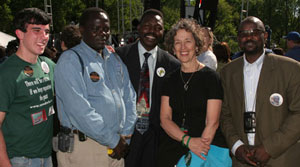

 Listen:
Listen:Adam Zuckerman on how a quote from Elie Wiesel inspires him
Elhadi Adam says a prayer in Arabic

 |
The Sudanese government's beliefs about Jews |
Adam, 34, tells his story with the intensity of a man who, along with other black Darfuris, has been the target of an ongoing genocide. Many of his family members have been killed in Darfur, and Adam doesn’t know who--if any of his relatives--is still alive. The massacre of African Muslims by Arab Muslims in Darfur which began in 2003, has resulted in more than 400,000 deaths and 2.5 million displaced people. And despite a peace agreement between the Sudanese government and the largest Darfur rebel group, the violence continues.
“If the woman is pregnant, they pull the baby outside and then, they kill the baby; they throw it in the fire,” Adam says. “This is the government we have in Sudan; they do those kinds of things.”
 |
How Arabs control the Sudanese government |
Before the bloodbath, Adam left Sudan to study international geography at the University of Lebanon in Beirut. When he graduated, Adam did not go back to Sudan for fear he would be forced to join the army or jailed. And so he found sanctuary in –of all places--Portland, Maine, where many Sudanese had already settled to take advantage of the peace and quiet. It was there that he found an unexpected advocate in 18-year-old Adam Zuckerman, a Jew.
 |
Linking the Holocaust and Darfur genocide |
Adam couldn’t stop talking about how much he appreciates the Jewish involvement in Darfur, saying, “We are very happy with the Jewish people and what they’ve done for us. It’s not a small thing.”
While Jews and Muslims have had a contentious relationship in modern times because of the fight for ownership of Israel, their joint efforts to end the Darfur genocide suggest that they have found a common cause out of which new forms of cooperation may grow.
In some ways Zuckerman is a fairly typical high school student –he likes playing tennis and frisbee, works at an Irish pub and sings in the chamber choir– but he also serves as co-president of his high school civil rights team and has spent time in Guatemala, Honduras and Costa Rica helping people in need.
When he saw the film, “Hotel Rwanda,” and heard Ruth Messinger, president of American Jewish World Service, speak at his temple about Sudan, he decided he wanted to do something to stop genocide. So he joined a group Adam belongs to, the Fur Cultural Revival of New England, which is a Portland-based organization of immigrants from the Darfur region of western Sudan. They loved Zuckerman so much; they made him an honorary member.
 |
How saving a life is a Jewish practice |
Rabbi Michael Namath, program director at the Religious Action Center of Reform Judaism, believes working together for Darfur has improved understanding between the two religions. “Whenever Jews and Muslims come together they discover things that are either a commonality or that there are stereotypes that are then disproved,” Namath said.
But for Zuckerman -- a young person who is not a community leader, let alone a national figure– his connection to Darfur wasn’t confined to a few symbolic statements linked to dates on the Jewish calendar. He is now one of the most outspoken U.S. advocates for Darfuris. His accomplishments include raising $6,000 over the past year to support the Save Darfur Coalition and to charter a bus to take protesters to the Darfur rally held in Washington on April 30. Also, Zuckerman testified as part of a campaign to get the state of Maine to divest state money from companies doing business in Sudan. In the spring, John Baldacci, the governor of Maine, signed the legislation which divested the Maine State University retirement system.
And the partnership between Zuckerman, Adam, and other Darfuris continues to warm relations between the faiths—at least in Maine. They have spoken at Colby College and organized a meeting with Congressman Tom Allen to gain his public support for the Darfur rally.
 |
What religious schools in Darfur say about Jews |
Zuckerman acknowledges bias among some Jews toward Muslims. “I've definitely come in contact with some people in the larger Jewish community that sort of see Arabs as a threat, see Muslims as a threat,” Zuckerman said.
 |
How the idea of action is at the core of Judaism |
Though the rally occurred in Washington, Jewish activism is not limited to the East Coast. At the Washington rally, Jews from temples in Los Angeles joined up with Jews and Muslims from the Bay Area to stand together on the imperative to end genocide.
Adam is especially impressed with Jewish involvement, because he believes not enough help had come from Arab countries. The situation may be changing, however. In early June, Amr Musa, the Secretary General of the Arab League, called for Sudan to accept UN troops in Darfur in an opinion piece published in the Egyptian press.
Personalizing the genocide is difficult, because it’s easy to become desensitized to numbers and forget they represent people. “A lot of times, people will say 6 million or 400,000 or whatever,” he says referring to the number of Jews killed in the Holocaust and number of Darfuri’s massacred so far in Sudan. “And I don't feel like that moves people. And I feel like when you put the stories, when you know that it's just one human life and one family is being killed or one human you can really relate to that.”
But instead of throwing up their hands, Adam and Zuckerman look to their faiths to ask God to end the genocide.
 |
How the Talmud inspires his Darfur action |
Though the tension between Jews and Muslims will not work itself out overnight, relationships like Adam and Zuckerman’s prove that the human spirit can connect even the most opposite people. If they can find common cause, there may be hope for saving Darfur.

